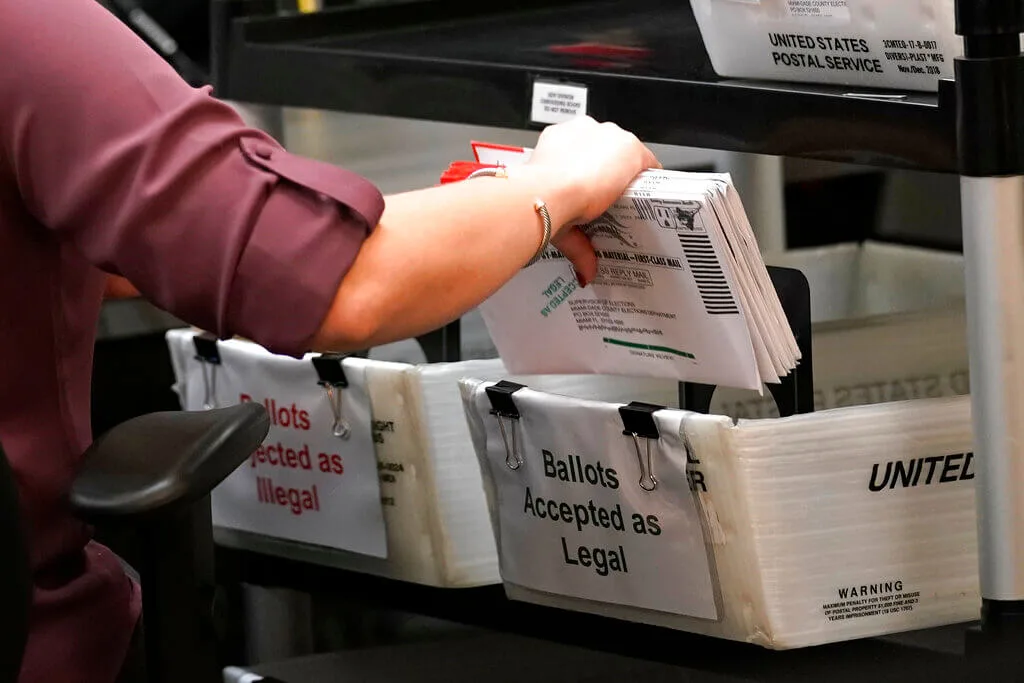
A federal court of appeals affirmed the state’s new re-enfranchisement law, which requires felons in the state to pay all court fines and fees before voting, violates the 14th Amendment.
Florida’s new “poll tax” for re-enfranchised felons is unconstitutional and its implementation must be delayed, a federal appeals court ruled on Wednesday.
The three-judge panel from the 11th U.S. Circuit Court of Appeals in Atlanta affirmed a lower court’s injunction on Florida’s new re-enfranchisement law, which requires felons in the state to pay all court fines and fees prior to voting. The judges ruled that this mandate violates the Equal Protection Clause of the 14th Amendment, which says states must guarantee the same rights, privileges, and protections to all citizens.
The law, passed by Florida’s Republican-led legislature and Republican Gov. Ron DeSantis, was largely viewed as a way to undermine Amendment 4, which restored voting rights to 1.4 million Floridians with felony records.
Florida voters approved Amendment 4 in 2018 by a massive 65-35 margin. The amendment provided that “voting rights shall be restored upon completion of all terms of sentence including parole or probation.” The amendment does not apply to residents convicted of murder or sexual crimes.
Previously, Floridians with felony convictions were permanently barred from voting again, under a law that dated back to the Jim Crow era.
Instead of implementing the voter-approved amendment as is, Florida Republicans tacked on additional legislation requiring all ex-felons to pay all fines, fees, and restitution associated with their sentences before they can regain their right to vote.
The measure has been criticized by voting rights advocates as a modern-day “poll tax” because it places substantial financial barriers in front of those affected by the law. Seventeen former felons and a coalition of voting rights groups, including the American Civil Liberties Union (ACLU), the NAACP, and the Brennan Center for Justice, filed a lawsuit over the law, calling it unconstitutional.
The three-judge panel agreed with their critique on Wednesday, ruling the state cannot require paying fines and fees as a precondition for enfranchisement.
In their ruling, the judges cited research showing that 59% of those affected by Amendment 4 owed at least $500 in fines, fees, and restitution, and 37.5% owed at least $1,000—substantial barriers which could once again disenfranchise hundreds of thousands of Floridians.
“It is undeniable that the LFO [legal financial obligation] requirement punishes those who cannot pay more harshly than those who can,” the judges wrote. “Denying access to the franchise to those genuinely unable to pay solely on account of wealth does not survive heightened scrutiny.”
The judges previously appeared skeptical of the state’s argument that “all terms of sentence” includes financial obligations and grilled DeSantis‘ attorney about how the law essentially creates two classes of felons—those who can afford to pay and those who can’t.
“Isn’t it punitive to say, ‘I will re-enfranchise this group, but not re-enfranchise this group?’” Judge Stanley Marcus asked in January. The court was hearing an appeal from DeSantis and Secretary of State Laurel Lee, who hoped to stop the preliminary injunction, first issued in October.
The broader case over whether the law is constitutional is set to go to trial in Tallahassee in April, but Helen Aguirre Ferré, communications director for Gov. DeSantis, announced on Wednesday that Republicans intended to appeal the decision “en banc,” before the entire 11th U.S. Circuit Court of Appeals.
Such an appeal could be successful, as the U.S. Senate recently confirmed one of President Trump’s judicial nominees to the 11th Circuit, flipping the court to a majority of GOP-appointed judges.
Even if that appeal fails, the case could wind up before the Supreme Court, which has a conservative majority and has a recent history of ruling against plaintiffs in voting rights cases.
Amendment 4 also faces another threat on the state level. In a separate case, the conservative-controlled Florida Supreme Court ruled in January that “all terms” included financial obligations, which has led some to theorize that they could strike down the entire amendment if the “poll tax” is struck down in federal court.
But for now, voting rights groups are celebrating Wednesday’s ruling.
“This is a great win for voting rights!” said Myrna Perez, director of the Voting Rights and Elections program at the Brennan Center for Justice at NYU Law. “The Eleventh Circuit told the state of Florida what the rest of America already knows. You can’t condition the right to vote on a person’s wealth.”
(This article was originally published on February 19 in the Courier Newsroom.)
Politics

Teamsters and UPS Reach Tentative Deal to Avoid Strike, 340,000 Workers to Get Raises
The tentative deal represents a huge win for full- and part-time UPS Teamster workers, who would get significant pay raises and better working...



One Republican Senator Is Blocking 265 Military Promotions, Leaving the Marines Without a Confirmed Leader
Sen. Tommy Tuberville's decision means these military officers are not getting the pay raises they’re owed, cannot move their families to wherever...
Local News



Teamsters and UPS Reach Tentative Deal to Avoid Strike, 340,000 Workers to Get Raises
The tentative deal represents a huge win for full- and part-time UPS Teamster workers, who would get significant pay raises and better working...



One Republican Senator Is Blocking 265 Military Promotions, Leaving the Marines Without a Confirmed Leader
Sen. Tommy Tuberville's decision means these military officers are not getting the pay raises they’re owed, cannot move their families to wherever...




